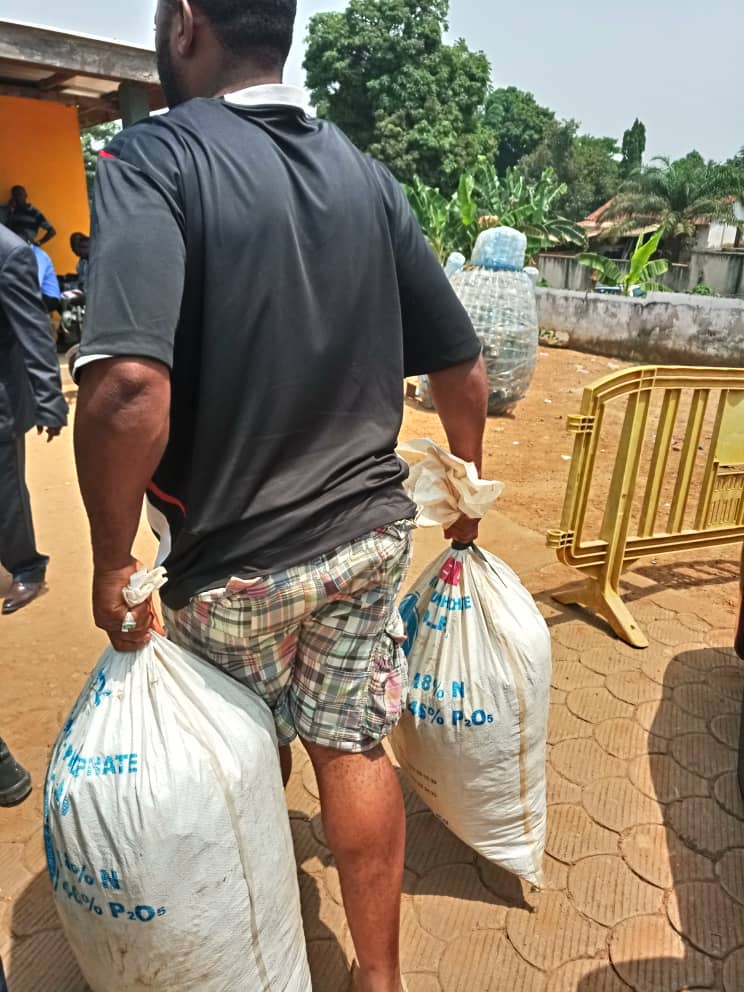
PAMACC News: Solidaridad will partner with the Nigerian government in its agricultural transformation agenda, the commitment made in its Nationally Determined Contribution (NDC) in the Paris Climate Agreement as well as achieving the objective of Sustainable Development Goals (SDGs) in the country.
This was disclosed when the team from Solidaridad West Africa led by Solidaridad Network Senior Climate Specialist for Africa Dr. Samson Samuel Ogallah paid a visit to the Federal Ministry of Agriculture and Rural Development (FMARD) and the Federal Ministry of Environment (Department of Climate Change –DCC and National REDD+ Secretariat) in Abuja.
Dr. Ogallah added that Solidaridad will continue to bring to bear in Nigeria and other African countries the organization’s fifty (50) years of global experience working in the development of profitable supply chains, climate smart innovations, creating sustainable businesses and livelihoods across 13 different agricultural and other non-agricultural commodities working closely with smallholder farmers and producers for a change that matters.
Dr. Peter Tarfa, The Director, Department of Climate Change (DCC) welcomed the team and recalled the successful partnership between Solidaridad and the Federal Ministry of Environment through the Department of Climate Change at the event held in the Nigerian Pavilion during the United Nations Climate Change Conference (COP24) in Katowice, Poland.
Dr. Tarfa commended Solidaridad for its role in Climate smart agriculture helping farmers to increase productivity sustainably, adapt to climate change and addressing mitigation actions along the value chain. While promising the support of the department and working closely with the organization, he called on Solidaridad to also consider its interventions in other commodities like cotton and groundnut in Nigeria in addition to oil palm, leather, fruits and vegetables and cocoa.
Solidaridad team were received by Dr. Moses Ama and his team at the National REDD+ Secretariat. Dr. Ama in his address stated that agriculture to date remain one of the major drivers of deforestation in many developing countries and express optimism that Solidaridad’s approach of doing business in the sector with its principle of ‘producing more with less’ will contribute to reversing these trends.
He added that investment in agriculture will be wasted without climate change considerations and welcomed the partnership between Solidaridad and Nigeria REDD+ Secretariat. The UN-REDD+ programme is the United Nations collaborative initiative for Reducing Emissions from Deforestation and forest Degradation (REDD+) in developing nations..
Dr. Ama also highlighted some of the interventions the Secretariat is currently undertaking including those supported by the Forest Carbon Partnership Facility (FCPF) of the World Bank in Ondo, Cross River and Nasarawa State among others.
At the Federal Ministry of Agriculture and Rural Development, The Deputy Director, Tree Crops, Mr. B.C. Ukatta led his team in an interactive session held between Solidaridad and the Ministry. Both team underscored the importance of working collaboratively towards achieving self-sufficiency in palm oil and other agricultural commodities in Nigeria. He commended Solidaridad’s climate smart approaches to agricultural practices and helping
In Nigeria, Solidaridad in collaboration with cocoa companies have trained over 27,000 farmers on Good Agricultural Practices (GAP) in cocoa production and about 78% of the producers trained have adopted GAP and there has been about 40% increase in productivity of producers under GAP.
Solidaridad West Africa (SWA) have assisted over 5000 smallholders’ cocoa farmers to become UTZ certified in Nigeria. Under its Sustainable West Africa Palm Oil Programme (SWAPP), Solidaridad has conducted studies on oil palm in Nigeria.
Strong awareness on sustainable climate smart oil palm production has also been created among stakeholders in the sector and Solidaridad supported the National interpretation process for Roundtable on Sustainable Palm oil (RSPO) Principles and Criteria in Nigeria. smallholder farmers to escape poverty through its various interventions along the value and supply chain in the agriculture sector in the face of climate change and its impacts on agriculture while pledging their support to Solidaridad.











